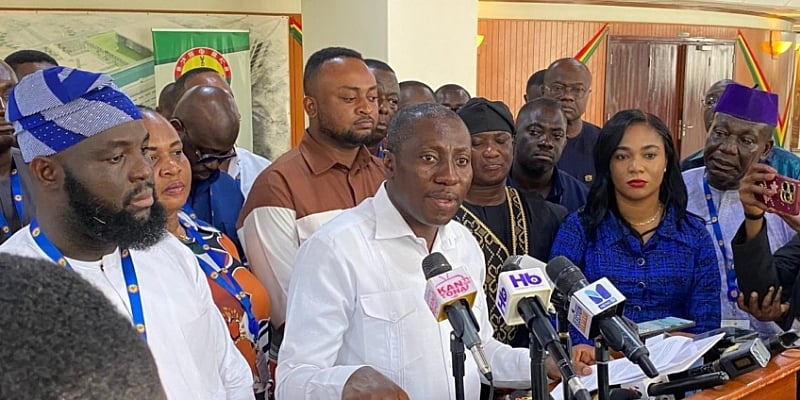The Minority in Ghana’s Parliament has sharply criticized Speaker Alban Bagbin’s decision to suspend three of its members, Hon. Frank Annoh-Dompreh, Hon. Alhassan Sulemana Tampuli, and Hon. Jerry Ahmed Shaib, following a disruptive incident during the vetting of ministerial nominees on January 30, 2025. The Minority contends that the Speaker’s action constitutes an abuse of power, a blatant display of selective justice, and an assault on the democratic principles that govern the legislative process. The suspensions stem from a chaotic scene that unfolded during the vetting proceedings, although the specific details of the disruption remain undisclosed in the provided text.
The Minority’s core argument centers on the Speaker’s alleged disregard for due process. They assert that the suspensions were imposed unilaterally, without adherence to established parliamentary procedures outlined in Standing Orders 130 (a) and (b). Furthermore, they argue that the affected MPs were denied their constitutional right to be heard, as guaranteed by Article 19 (1) of the Constitution. The Minority also emphasizes that the Speaker failed to exhaust internal disciplinary mechanisms before resorting to suspension, setting a dangerous precedent for future parliamentary conduct.
The Minority portrays the Speaker’s decision as an arbitrary punishment based on perceived disobedience rather than a measured response to a breach of parliamentary rules. They argue that the suspensions disregard the inherent nature of Parliament as a forum for debate, where passionate exchanges are expected. The Minority emphasizes the duty of all members to ensure due process is followed, even in the midst of heated disagreements. They view the Speaker’s action as an attempt to suppress dissenting voices and create an environment of fear within the legislature. This, they argue, undermines the principle of robust and open debate that is essential for a healthy democracy.
The Minority’s concern extends beyond the immediate impact of the suspensions. They warn that the Speaker’s actions, if left unchallenged, could establish a dangerous precedent where he becomes an unchecked authority, wielding disciplinary measures against those who challenge his political views. This, they argue, would create a chilling effect on parliamentary discourse, discouraging members from freely expressing their opinions and holding the executive branch accountable. The Minority believes that such an environment would erode the democratic principles that underpin the parliamentary system.
In their statement, the Minority categorically rejects the suspensions and demands their immediate reversal. They characterize the Speaker’s decision as politically motivated and warn of the long-term consequences if such actions are allowed to stand. They call for a return to due process and fairness in parliamentary proceedings, emphasizing the importance of upholding the rights of all members, regardless of their political affiliation. The Minority’s strong reaction underscores the significance of this issue and the potential implications for the future of parliamentary democracy in Ghana.
The Minority’s call for the reversal of the suspensions represents a broader appeal for the protection of democratic principles within the Parliament. They argue that the Speaker’s actions undermine the integrity of the legislative process and threaten to create a climate of fear and intimidation. They urge the Speaker to reconsider his decision and uphold the principles of fairness, due process, and open debate that are essential for a functioning democracy. The Minority’s stance highlights the importance of safeguarding the rights of all members of Parliament and ensuring that the institution remains a vibrant forum for the expression of diverse views. They frame this issue not merely as a dispute over parliamentary procedure, but as a fundamental defense of democratic values.


